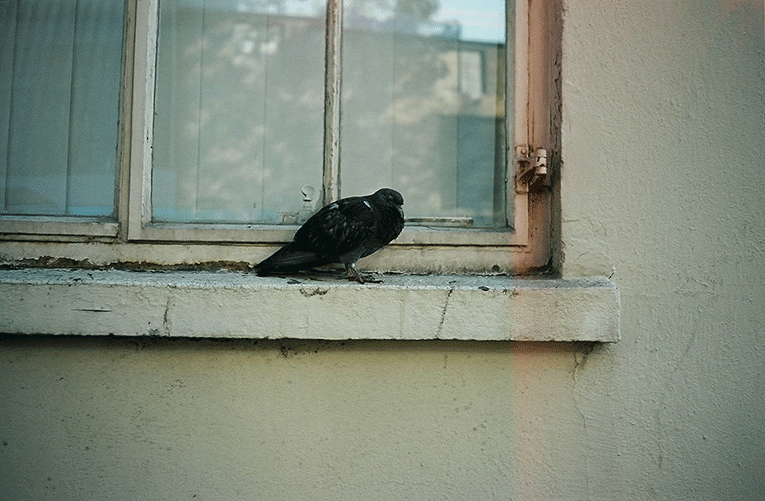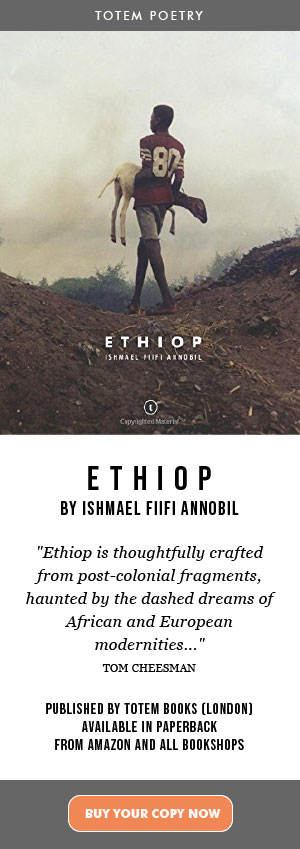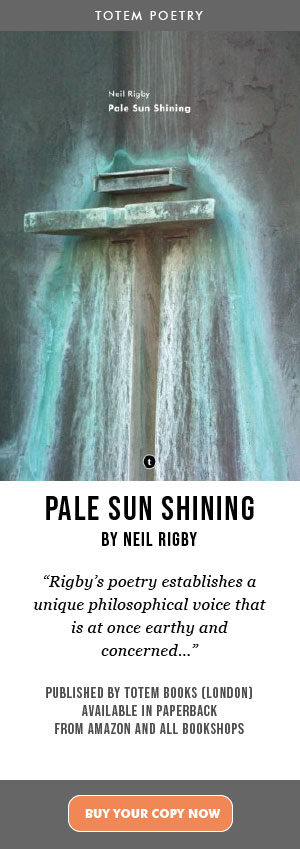Poetry & Prose : PORTRAIT OF A MAN IN PAIN

PORTRAIT OF A MAN IN PAIN
By Ishmael Annobil
Abraham doesn’t talk about World War II anymore, but he lives it. His mental scars have made him allergic to all mimicry of war. During end of year festivities, when the fireworks invoke hope, he cowers in the scant comfort of his shack, which stands on the water’s edge as though its occupant had the Noah urge. He clasps his gnarled hands over his ears to stop the boom-bang from hurtling him back to the crimson landscapes strewn with bloated corpses, some torn in half, others with their own arms beyond their reach in the sodden trenches – the drool, pink froth, blood, the impulsive excreta of dying men, the churning, gurgling war machine, the howling, groaning, howling.
He still wears the combat fatigues he was issued on the day of his draft. They occupy his person with the audacity of selective nostalgia. Only, the puttees have since become threadbare, fleeced by the chemical fury of his chronic war-sores that fester under them and ooze pus to his bare feet. And his battered boots hang from the rafters like butchers' relics. His soldierly dignity is thus undermined; and sullied further by the frenetic houseflies that fancy his smouldering legs for bivouacs to lay their maggots in. But theirs is a futile dream. Their intended host is a resolute self-protector – a cornered man. He keeps his legs moving, cursing the flies with all his might; because, turgid as his legs are, fly swatting would be a dicey affair. For that matter, he can predict their every move. He starts cursing a fly long before it makes its move. For good measure, he employs iodine tincture and a stridency of herbal concoctions. Even then the flies continue in their dream, goaded as they are by the instinct for birth. They, too, must defeat mortality; out-number it. So they tail him like fulsome courtiers of a god-king, sapping his energy, waiting for him to drop. It’s a stalemate. That is not to say Abraham doesn’t appreciate the curative value of maggots in a sore. It’s the indignity of it. The semblance of carrion. Mortality.
Subconsciously, though, he loves this war of attrition. It keeps his wits whetted. Indeed, the flies are his only company. He would miss them if they suddenly vanished. With them, at least, he has something to practise the rudiments of war on. Over the years he has even developed a strange fondness for them, the type of fondness boxers reserve for their toughest opponents. So, though he applies the iodine religiously, he hates watching them writhe in it. It’s the way it blinds and pins them into throes that tugs at his heart. To appease them, he smiles at their newborns when they make their first appearance on the ‘battlefield’. He calls them ‘recruits’, and if they get too brave, he merely blows at them, as he would down feather. This eternal sentry duty means that, despite their short lives, Abraham manages to know each fly rather well. He gives them names according to their personalities, and he remembers flies that died many years ago, as though they were human.
For Abraham is not on good terms with humans anymore. They have deserted him. Market women cover their wares and their children’s faces when he passes their stalls. And his fellow men use him. They use him for courtship – they zoom onto him like forsaken kamikaze, shoving him in the chest, just to catch the eye of a woman. And he just walks away with a pained smile lest he batter somebody to death. They use him. So he has chosen to be part of the “dawn horizon”, as he calls it, and its sobering dew. Because at dawn he is ahead of time: the flies are still damp and flightless, the abusive mouths and hands of humans are yet unfreed by sleep’s juices, and he can roam freely, even walk in the middle of the road if he wants, for love is between himself and nature only. And nature serenades him with its plaintive music; the subdued creaking of crickets, the purpose-laden rustle of a foraging dormouse, the sudden prattle of a stray dog’s ears, as it breaks out of its wet canopy of cocoyam leaves, the jingling and whistling of a distant tinker. Until, that is, the coughing and cooing truck engines start to alert humanity to life’s burdens, then he recoils.
Little does he know that his preference for dew has made him a part of this alert. It is normal to hear a late-rising kenkey seller ask, “Has Abraham passed by yet?” But, like all those whose journeys have slowed into nature's stream of agonies, Abraham’s timepiece significance to society is, in reality, a full cycle behind the long shadow of time. Bathos. This he acknowledges without a quibble. Yet, romantics may say he is unmarked by time; that he transcends it triumphantly. If so, then little wonder his history lies mainly in the hands of that invisible rumour monger, who tells us: “That man came back from Burma with live leeches dangling between his toes – he wanted to poison them with his blood.” In other words, Abraham is a social oddity. Pariah. He has lost his very being to such offbeat folklore – his loves, hates, habits, ambitions, and even his true identity. Most people just call him Yaro, the Hausa word for little boy. Indeed, he shares this 'yaro' nickname with all other men of northern Ghanaian origin, be they Manprusi, Frafra, Hausa or Gonja; be they kings, peasants, doctors, witchdoctors, hunters or street hawkers.
Abraham is a Gonja man living in Accra. He is just a number to all that sail past him at the close of dawn, in their hurry to catch destiny in their pockets. He knows from their quick, curious glances that they think him mad. Yet, he draws some pride from the fact that the Gonja race is, indeed, a genetic alpha of Ghana; which makes him is a walking, breathing ancestor. A secret blueprint stashed away for now, waiting for future re-assertion by those that hear it loudly enough in their blood, or on their consciences. For now, however, he remains a victim of historical and social accidents, – his own inner demons included – and the whims of the pompous, which conspire doggedly to keep him in check. So he loves solitude.
But Accra is a delightful city, all right. It's the great melting pot of peoples, persuasions, and colourful juxtapositions of old and new things. Here, pinhole daguerreotypes and SLR cameras exist side by side, vying for viewpoint, each stubbornly striving to capture a unique view of this cosmopolitan culture, though their operators are united by an unchanging style: posed. Always a portrait. And the backdrop to each portrait is a ubiquitous, folksy aeroplane painted on canvass, with its looming gangway skewed slightly to aid your embarkation, promising nearness to the heavens. Crude and disproportionate as they are in their vanity, these aeroplanes never boast the national flag – only European and American ones. The message is clear – fly away. After all, it’s a genuine artistic response to the nation's congenital, itchy feet.
Yet this city remains an anchor even to restless hearts. Though talkative and clamorous at times, it has a soothing charm about it, through which the latest Mercedes cars swagger, spicing up the vista, as true anachronisms should, attempting to confuse time, but barely managing to leave their blurry tail lights in the picture that finally emerges from the roadside darkroom. For this is also a deeply traditional city. Rustic, always rustic. And despite its attempts at Mies Van de Rhoe and Le Corbusier architecture, Accra remains a city with a big, organic soul. Its populace stands up at all times to be counted – bold with a dizzying smile, intelligent, deep, and extraordinarily poetic. It is the type of city that rests on an ancient ease, born either of wellbeing or complacency, resignation or purity, or a privileged knowledge of arcane truths. This quality makes it a simple city to the eye, but very complex to the touch. Once in a short while, this ease is jolted by the sonorous voice of a gong-gong beating town crier from an earlier age, or by an all-pervading celebration of musical rhythms, or a giddy political rumour or two. Political Cassandras abound here. So too do customs, taboos, superstitions, ancestors, myths and legends, phantasmagoria, rituals, gods, sedate Christianity, charismatic Christianity, crypto-Christianity, proto-Christianity, Islam, soothsayers, sacraments, effigies, icons and the vibrancy of colour – all a sweet, ubiquitous alchemy that follows your every step, from cradle to grave.
That histories have been made in Accra is all too obvious. You see this in the many lingua francas oiling the hustle and bustle of marketplace. And there are the numerous architectural influences, which climax into an overweening castle – the ever-tantalising Christiansborg, that is. From the outside, you'd never suspect this whitewashed castle of having had a hand in the primal Afro-European sins of the past, but its dungeons, which were designed to open directly onto the high tide of night, still howl with the pain. It always puts you in mind of a dark, skulking ship swaying patiently in wait for the human fare. Since independence, however, Christiansborg has been the official residence of rulers of the nation. Ironic. It's as if by residing in this castle they hope to exorcise the ghost of the ancient debaucher. Or do they hope to see through the eyes of that ghost? Painful largess. A few castle coups have already occurred here. The obeah has not been contained yet. Except, of course, Christiansborg’s cannons do not breathe fire at the sea anymore. The great Atlantic is tranquil at its feet, and seagulls use its ramparts and royal palms as springboards for diving onto herrings in the piquant, blue waters below.
But easy or not, Accra is not a typical African city. It isn't one of those social tapestries that are totally cohesive and rounded off at the edges. It dwells on an underbelly of diverse racial (not tribal) parts, with subtle distances between them, each slightly at loggerheads with the others, but all adhering willingly to the dominant credo of Accra: Ablekuma Aba Kuma Wor (may the stranger dwell on our hospitality). That is to say the stranger is a person without contacts, and so must be pampered. Needless to say, this credo has already made an urban sprawl of this city. Its sides are bursting with it. Squatters inhabit this confusion, industriously, sinking their roots, too, and somehow achieving that esoteric idea of birthplace. And because Ghanaians are not cold social engineers, they cannot stop the sprawl by force. The city council daubs unauthorised buildings fervently with red cancellation crosses, to humiliate their owners, but it stops there.
So then Accra is a complex jigsaw, and though this may seem a recipe for racial strife, nothing has dared touch it’s underbelly deeply enough for that to happen. However, this liberal city has the habit of naming every inch of its land along racial and historical lines, as if to impose a token lease on the pleasure of newcomers. Atukpai (or Fractured Guns), for instance, is where Accra magic is said to have once befallen the gun barrels of Ashanti invaders, sometime in the 19th Century. But Accra is also a romantic namer: Mataheko (I'll Sit Somewhere) is where a weary land-quester is said to have retired from the race; and Kaneshie (Under the Light, or Illuminated) is said to have once lain at the foot of a luminescent hill, long tumbled by British town planners.
After all, Accra has an owner: the Ga. They are said to have been named for the large red ant, ga-ga or inkra, which bumbles along peaceably in the undergrowth, until harassed, then it becomes a formidable combatant. Hence ‘Accra’, presumably a British corruption of inkra. A Hamitic people, the Ga are said to have arrived on these shore in early mediaeval times, after their long trek from Mesopotamia, and after establishing the intermediate colony of Ile Ife, in today's Nigeria. They had arrived here with a unique mixture of Old Testament religiosity, forgiveness and hospitality – the three cardinals. They enjoy a justifiable belief in divine providence and retribution. For this matter, no one loves the Ga more than Abraham. He especially admires them for their political restraint, which always manages to eclipse their loud nationalism. After all, they invented that credo of tolerance. "They dream like an angels," Abraham always says of them. And as all Ghanaians know, the Ga are the first to offer you help when you faint in public, they are the first to cover the face of a disgraced corpse, they'd feed your children, should you tally, and they are the first to adopt the motherless child, even if they have too many of their own. If Abraham were to sum up the Ga social ethic he might say: 'Survival of the weakest'.
Once a year, however, the Ga invoke their ancestral rights to the city and take it back for Homowo, their harvest festival. Even then, they pay homage to others – the festival's war songs, incantations, liturgies, appellations and airs contain huge strands from other Ghanaian peoples with whom they once had communion. Little wonder, their Effutu cousins refer to them as Ashiedu Ketekre, or a mat on which one lies without fear.
But even Abraham's love for this city has its limits. He hates the rampant insults by one race against another. It spoils the fun for him. It is an epidemic; it’s a part of daily banter. It's as though each race has to call the others names to remind themselves of their own unique identity. The blase´ call it a lover’s fight, but Abraham, the World War II veteran, knows it for what it is: a bad seed. Something with the potential to beget havoc, should a Hitler occur here. The human mind craves tragedy through comedy – history predicts that. “The jokes prepare the lamb for the slaughter,” he says. Yet he stays on, hoping that one day the dark cracks he and others inhabit in this fascinating metropolis will be lit up for all to see. But his long suffering has sapped him. He is fast approaching madness, and he knows it. Battle weary as he is, he can choose to ditch everything and lean back into total madness, or even death, and enjoy it. But he must wait. He must. He is waiting for thunder.
His only wish today is to survive past midnight. It's New Year's Eve, and the fireworks will be doing their thing to him. He's been up since dawn, bracing up, his hands are quivering over his ears. Time tallies. The Harmattan chill has confounded the cockcrows. Hope can wait.
Illustration: Lonely pigeon, by Ishmael Fiifi Annobil


